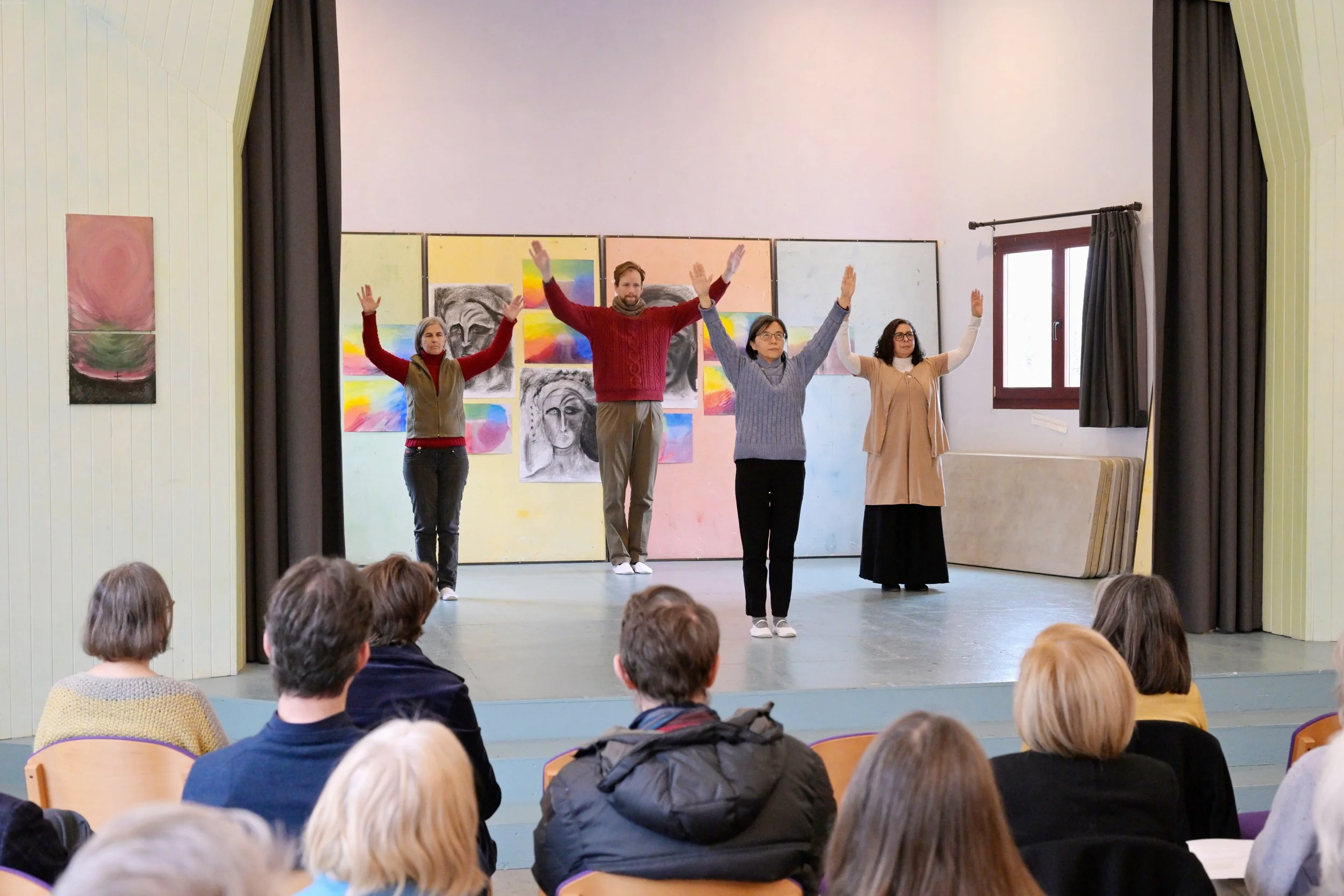What is Love? A Word about a Word
by Claire Jerram
On Wednesday, November 22nd, the nine on-site Seminary students presented their work with the Word to the congregation and guests, including the students from Rudolf Steiner College. The sharing was opened by a word about Love from Claire Jerram. In this article we are happy to share the transcript of her speech and more details about the event.
At the end of Septemer the students of Rudolf Steiner College (RSCC) have invited the Seminary students for their Michaelmas festival. (Click here to see a blogpost about this event on the RSCC blog.) We were very glad to reciprocate, by inviting the RSCC students to the Seminary for a sharing out of our work with the Word. During the event, the audience heard an excerpt from the story of Elijah in the Hebrew Bible, a contemplation on the process of initiation as described in Rudolf Steiner's Christianity as Mystical Fact, two Psalms, and poems from Gerard Manley Hopkins and Angela Morgan. The seminarians also sang a traditional shapenote hymn "David's Lament". The audience could also appreciate the artwork from the Seminary Art course and join the students to sing an “Amen” by Julian Pook and express Alleluia in eurythmy. Afterward, guests and the seminary students had time to get to know each other over refreshments. The whole event was opened by a word from Claire Jerram. Below you can find the transcript of her speech. You can also see more photos from the event in the RSCC blogpost about it.
Welcome to the Seminary of the Christian Community in North America. Part of what we learn here is to serve the Word. What is our experience of the Word in our time? Perhaps you grew up watching “A Charlie Brown Christmas” at this time of year. If you did, you would have seen cartoon children walking around, talking to each other. And if an adult spoke, you would hear no words, just an indistinct, “Wah wah wah.” As a teacher I sometimes felt that my students experienced my words in this way. Another experience of the word that we have is little black marks upon white paper or screen. Here, as in the “Wah wah wah” a mere fragment of the Word shows itself.
In reality the Word is a being. One way we can get closer to the full reality of the Word, is to begin to love its children, that is — to love and learn about each word. Today in our speech sharing, you might hear some words that create specific pictures for you: God, Lord, Christ, Jesus. I ask you to listen with an open ear, to ponder about the full reality of these words. And I will speak today about another word: Love.
We use the word love all the time. Ninety-five percent of all pop songs sing about love. We can get the feeling that it must be important. But also the feeling that there must be more to this word than attraction and sentimentality. The ancient Greeks had at least three (some say six) words for love, and C. S. Lewis writes about these as well: romantic love, familial love, and unconditional, sacrificial love. In English we can hear that all these shades of love come together in one word, a word which poses us a challenge.
M. Scott Peck, the writer of The Road Less Travelled, saw many patients in his psychology practice. People showed much confusion about the meaning of the word love. He came to the understanding that love is time plus effort. If someone spends time with you, and they make an effort for you, they express love. The more time we spend, the more effort we make for someone, the more we love them.
Seminary students performing a eurythmical expression of Alleluia
There was a man who lived in Roman times: very educated, a world traveler, much like people of today. He held not only knowledge, but power. He stood by and approved while a circle of his friends threw stones at a man until he died. A few days later, this man, later called Paul, was walking along a road toward the city of Damascus. He was planning further violence against the friends of the man who was stoned. Suddenly Paul experienced the being of love. He saw a bright light, and heard a voice. The being of love challenged Paul. It told him that he was persecuting it. Paul heard this voice, took it in deeply. This being of love changed Paul. He spent the rest of his life sitting at the feet of love, giving it all his time and effort, traveling the whole Roman world by foot, and learning what love would have him do.
And here is what he learned about love: what it is, what it is not. He learned that it is a teacher which can mature us, can lead us from a partial knowing to revealing its true being. He wrote about this to some friends in the Greek city of Corinth, who were also trying also to learn about love.
1 Corinthians 13 (New Revised Standard Version)
If I speak in the tongues of mortals and of angels, but do not have love, I am a noisy gong or a clanging cymbal. And if I have prophetic powers, and understand all mysteries and all knowledge, and if I have all faith, so as to remove mountains, but do not have love, I am nothing. If I give away all my possessions, and if I hand over my body so that I may boast, but do not have love, I gain nothing.
Love is patient; love is kind; love is not envious or boastful or arrogant or rude. It does not insist on its own way; it is not irritable or resentful; it does not rejoice in wrongdoing, but rejoices in the truth. It bears all things, believes all things, hopes all things, endures all things.
Love never ends. But as for prophecies, they will come to an end; as for tongues, they will cease; as for knowledge, it will come to an end. For we know only in part, and we prophesy only in part; but when the complete comes, the partial will come to an end. When I was a child, I spoke like a child, I thought like a child, I reasoned like a child; when I became an adult, I put an end to childish ways. For now we see in a mirror, dimly, but then we will see face to face. Now I know only in part; then I will know fully, even as I have been fully known. And now faith, hope, and love abide, these three; and the greatest of these is love.
Our Author:
Claire taught at the Waldorf School of Baltimore for seven years. She was part of the Hillsdale Seven, who improvised their own pop-up seminary experience during the Spring of 2021. After that she was an intern in Stourbridge, England and Washington, D.C. Now she is back in Toronto, continuing her journey towards ordination.




